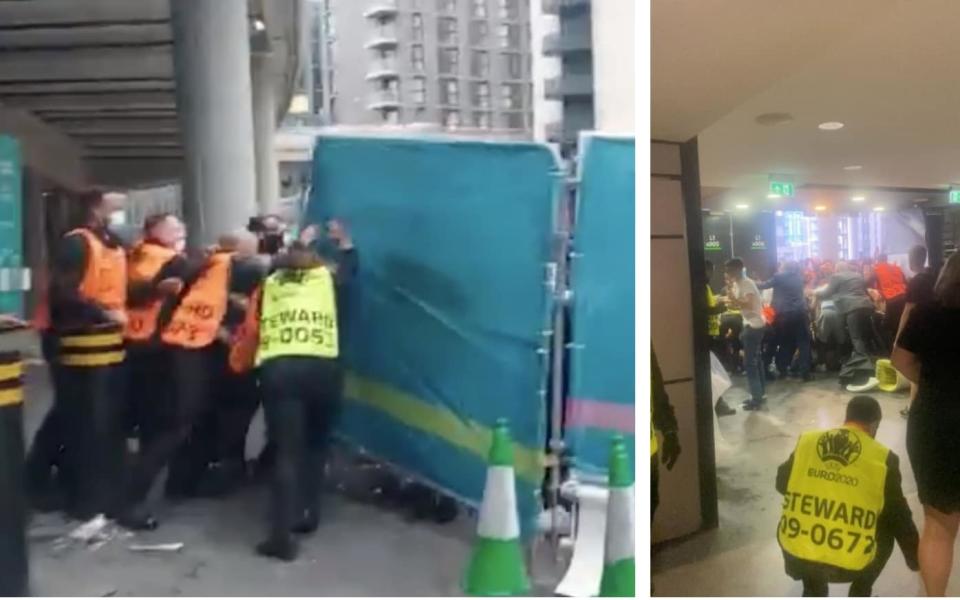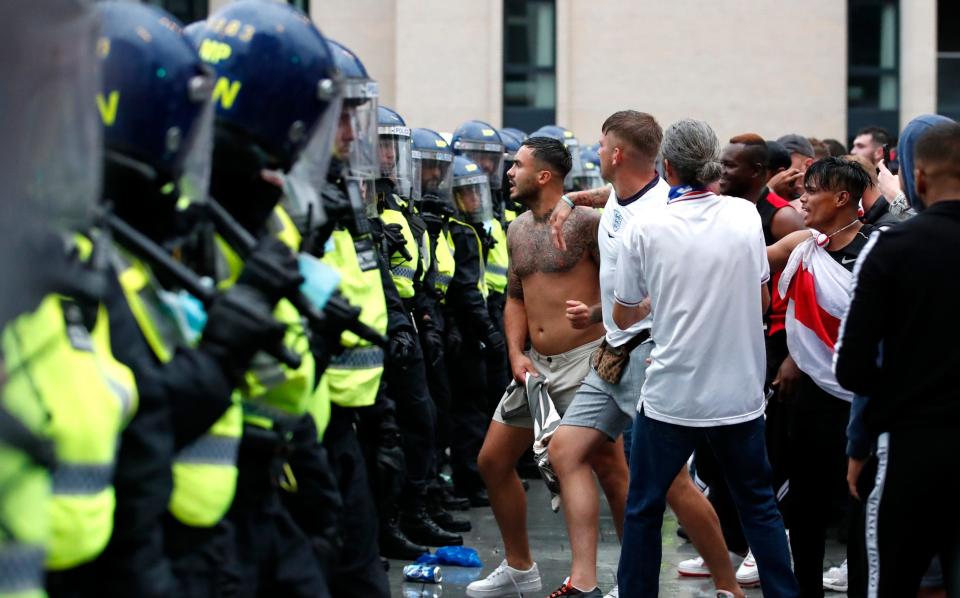Terrified families of England stars ran from ticketless mob that stormed Wembley

Terrified families of England stars were forced to run from ticketless hooligans who stormed their way inside Wembley Stadium for Sunday’s final of the European Championship.
And some families of players were also victims of attempted thefts of their tickets at the pick-up points and in the chaotic queues at Wembley’s Entrance G, near the Bobby Moore statue, as they tried to enter the stadium.
The frightening situation was not just confined to families of England players either, as it emerged that the son of Italy head coach Roberto Mancini, Andrea, found his seat was occupied and watched the first-half “sitting in the stadium’s steps”.
What should have been one of the proudest moments and a day to remember for families of the players, regardless of the result, turned into a nightmare for many who were left feeling scared and intimidated for much of the final.
The most shocking reports were of England players’ families being caught up in the crush as around 50 thugs without tickets managed to storm their way into the stadium at the families’ entrance.
One family member said: “About 50 people forced a metal door by the turnstiles open by bending it right back. Then loads of guys from everywhere just charged the opening to get in.
“The stewards couldn’t cope or stop them. I felt so sorry for them, they were getting kicked and punched. Hundreds got in and women and blokes that were queuing up were pushed over and trampled. We just ran, thinking we were going to get trampled.”
A relative of a different player added: “It was chaos. All these people with no tickets just stormed in. A lot of the families felt unsafe. There was nothing the stewards could do.”
Other families, some of whom had small children with them, reported incidents of gangs hanging around by the turnstiles trying to grab their tickets as they queued and approached the entrance. There was also thought to be a case of an attempted theft near the venue from which families were told to pick up their match tickets that had been left for them by the players.
The situation did not improve for the families once they were inside the stadium, as they found people without tickets sitting in their seats who moved from row to row after being moved on and loitered in the aisles.
At least one member of a player’s entourage is thought to have been verbally abused after asking somebody to move from their seat, with the situation getting ugly enough that others had to step in to move the hooligan on.
Another family member said: “It was not a good experience for anyone and it was very intimidating to be part of and to watch. In many ways it ruined the day and we’d definitely think carefully about who we brought with us if England are involved in another big game at Wembley.”
Confirming his seat was taken by a ticketless so-called fan, Andrea Mancini, son of Roberto, said: “There was a mess with ticketless fans and my seat had been taken, so I had to watch the first half sitting in the stadium’s steps. I found another place in the second half. Perhaps it brought good luck.”
Members of the general public were unable to get to their seats at all and some supporters even stood in the disabled sections because of the number of ticketless fans inside the stadium and the congestion in the aisles.
Asked about the scenes of disorder that blighted the final, England manager Gareth Southgate said: “We can’t control that. We can only set the example that we believe we should and represent the country in the way that we feel you should when you’re representing England.
“Everybody has to remember when they support the team that they also represent England and they should represent what we stand for. The players have done that brilliantly and we can only continue to try to affect the things that we can. We have had a positive affect on lots of areas of society, but we can’t affect everything. Other people have responsibility in those areas and we’ve all got to work collectively to constantly improve those things.”
We witnessed this and I stepped away just in time. If this is even crossing your mind, don’t. You don’t get far. Please don’t ruin it for everyone at Wembley. pic.twitter.com/CoNx4U4CHb
— Michelle Owen (@MichelleOwen7) July 11, 2021
The FA condemned the thugs who broke their way into the stadium, describing them as “an embarrassment”.
In a statement, the FA said: “We strongly condemn the behaviour of a group of people that forced their way into Wembley Stadium before the Euro 2020 final. This is entirely unacceptable.
“These people are an embarrassment to the England team and to all of the true fans who wanted to enjoy one of the most important matches in our history.
“We will work with the relevant authorities to take action against anyone who is identified to have illegally forced their way into the stadium.”
Wembley was forced to backtrack on an initial statement that claimed no breach to the entrances had been made by releasing a second statement that said: “There was a breach of security and a small group of people got into the stadium.
“We are now working closely with stadium stewards and security to remove these people. Anyone inside the stadium without a ticket will be instantly ejected.”

The Met Police confirmed after the final that 45 arrests had been made, but questions have been raised over the security arrangements both outside and inside Wembley.
One source told Telegraph Sport: “There were loads of rumours after the Denmark game that people had got in illegally without tickets, so you would have thought that the security would have been extra tight after that.”
Major fears 2030 World Cup bid wrecked by Wembley hooligans
By Ben Rumsby
There are major fears Britain and Ireland’s 2030 World Cup bid could have been wrecked after hooligans stormed Wembley during England’s European Championship final defeat to Italy.
The Government is currently grilling those responsible for policing the country’s biggest match for 55 years - and Parliament is set to do the same - over some of the worst violence at an international in the UK for many years.
The Football Association is also facing a heavy fine, and even a suspended stadium ban, from Uefa after scores of apparently ticketless hooligans forced entry to Sunday’s game and ran riot inside and outside the ground.
And there could be worse in store for the FA from European football’s governing body over the scenes that marred the latter’s quadrennial showpiece ahead of a decision over which of its members’ 2030 World Cup bids it puts forward to a vote at Fifa.
Britain and Ireland had looked to have stolen a march on a joint Spain-Portugal offering back in April after Boris Johnson helped bring down the Super League.
But those behind the GB&Ire bid admitted Sunday’s scenes, and the shambolic security operation that failed to prevent them, had harmed their efforts to bring football home again.
A senior figure at one of the FA’s bid partners told Telegraph Sport: “It can’t help things - looked like chaos outside the stadium.”
Security was meant to have been stepped up on Sunday after some ticketless fans got into England’s semi-final win over Denmark, which saw Uefa fine the FA more than £25,000 after a laser-pointer was shone in the face of Kasper Schmeichel, as well as other offences.
Jim Boyce, Northern Ireland’s former Fifa vice-president, said Sunday night’s “disgraceful scenes” had once again brought English football into “complete and utter disrepute”.
“The England team did the nation proud. They did the good football fans of that country who have been starved of success for a long time proud. But, unfortunately, the headlines today are once again reflecting on idiots and drunken louts.
“It would be wonderful to see a World Cup back again in the United Kingdom and, certainly, the events of Sunday night do not enhance the prospects of it happening.”
One senior figure involved in England’s doomed 2018 World Cup bid said Sunday night’s scenes were compounded by English football’s historic hooliganism problem.
“They are going to take that into consideration, particularly with Uefa, with clubs and the problems we had,” he said.
Oliver Dowden, the Culture Secretary, quizzed the FA on Monday about the security lapses at a match both he and the Prime Minister attended.
A Whitehall source said: “There are some quite big questions to ask about the policing and stewarding.”
Julian Knight MP, the chair of Parliament’s Digital, Culture, Media & Sport select committee, said he would be asking similar questions when the FA next appeared before him.
“It’ll be a major subject for us to discuss because, for me, their duty of safeguarding to the fans is absolutely central to what they do and, without it, frankly, they’re not doing their job.
“There needs to be a full inquiry from the Football Association which needs to be released into the public domain in order to set up precisely what went wrong and what lessons will be learnt.
“We are incredibly lucky that potentially the greatest night in English football in more than half a century wasn’t marred by the most awful tragedy.
“I can’t imagine what the families of those to have lost people in the past in such situations would feel watching those scenes.”

Among the questions facing those responsible for security were why the initial checkpoint for ticket-holders was so close to the stadium when most major events employ a wider ring of steel, and why so few police appeared to be on duty at Wembley.
Mark and Nicola Palios, the respective chairman and vice-chair of Tranmere Rovers, attended Sunday’s game and were “pushed to one side” when one of the ticket checkpoints was rushed by fans.
Mark, a former FA chief executive, said he was “loath to criticise” but said there appeared to be “no support” by police for overrun stewards.
“The general impression is that they were not prepared for it,” he said of those responsible for security at the ground. “It’s quite embarrassing. This is our national stadium.”
There was also criticism of tournament organisers for scheduling the final at 8pm on a Sunday, which gave fans celebrating England’s first major final since the 1966 World Cup a whole weekend’s drinking time before the game.
“Why do you choose eight-o’clock at night on a Sunday?” said Palios, of a kick-off time that would have suited the lucrative North American television market.

 Yahoo Sport
Yahoo Sport 





































